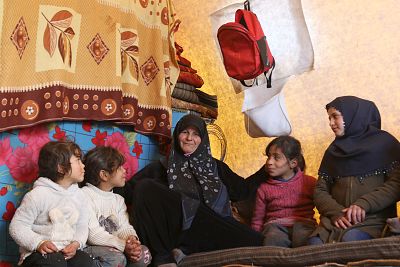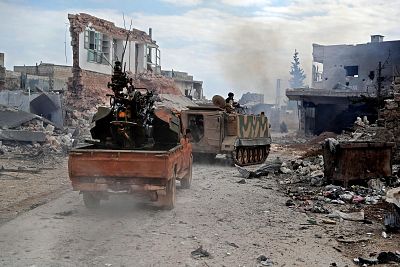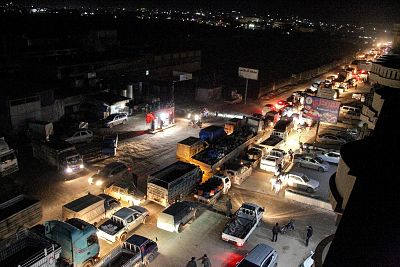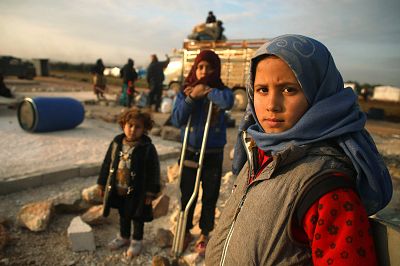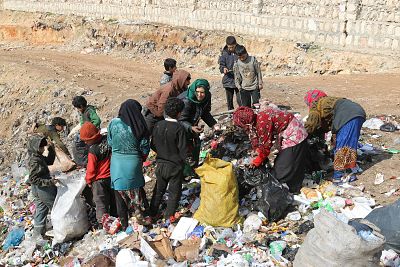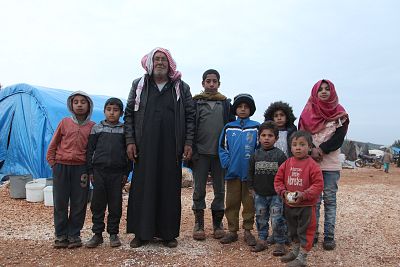"On a daily basis, fear surrounds us on all sides," Fadel Kanab, a father of five, said at a camp north of Idlib city.
Let us "all die together," a Syrian woman who lost her three sons in the long-running Syrian war and is left to care for four young grandchildren, said she prayed.Zaheda al-Hussain**,** 56, is like hundreds of thousands of others who are part of a humanitarian catastrophe unfolding in northwestern Syria — the scale of which even the United Nations failed to foresee."I prayed, I asked God that we all die together," the 56-year-old grandmother told NBC News. "The regime and Russians killed millions of Syrians — let us be the next."As Russian-backed Syrian government forces accelerated their campaign to retake the Idlib province — the country's last rebel stronghold — al-Hussain was forced to flee her rural village of Ma'ar Shoreen.
She is one of more than 948,000 people — the vast majority women and children — who have been displaced by the fighting and indiscriminate attacks in the region since Dec. 1, according to the United Nations.The United Nations Children's Fund (UNICEF) has said it received reports that at least nine children and three teachers were killed as 10 schools and kindergartens came under attack in Idlib on Tuesday.As the front lines grow closer, many are pushing north toward the border with Turkey. But that has been closed to Syrian refugees since 2015.Turkish President Recep Tayyip Erdogan has demanded that forces loyal to Syrian President Bashar al-Assadpull back to previously agreed positions by the end of the month. Erdogan has threatened that his forces will intervene unless they do so.In recent weeks, Ankara has beefed up its presence in the region sending hundreds of military vehicles and troops into Idlib province, according to The Associated Press.
Erdogan's primary objective in Idlib is to ensure that there is not another large flow of Syrian refugees across the border, analysts have told NBC News. The country is already struggling with the3.6 million Syrian refugees it currently hosts."I do not know what will happen to us if the Syrian army takes over the border," said al-Hussain, who has lost three sons in nearly nine years of war and has been left to care for four of her grandchildren.She added that she would not live under the rule of Assad."He killed my children and destroyed Syria," she said. "I'd rather die."After months of heavy bombardment, resentment toward the Syrian leader runs deep in Idlib — a region roughly the size of Delaware.
Once famous for its olive groves, the province was home to some 3 million people before the latest wave of violence. Now, those trees are being used for shelter and an estimated 2.8 million people in northwest Syria require humanitarian assistance, according to U.N. Secretary-General António Guterres.Al-Hussain, who was wearing a dark head scarf printed with a cascade of white flowers, spoke to NBC News in a camp on the road north to Turkey."We became a number," she said earlier this month. "Now we are tent No. 6."Even having a tent makes al-Hussain and her grandchildren luckier than some.According to the latest U.N. estimates, there are currently more than 4 million civilians in northwest Syria — more than half of whom have been forced to flee several times. Some 80 percent of the newly displaced are women and children and numerous elderly people are also at risk.Many have been forced to seek shelter in other people's homes, abandoned buildings or even under Idlib's famous olive trees.
The speed of the front line's movement "has been quite dramatic for a lot of the people and it's forcing them into areas where there is such limited space," said Sally Thomas, a project coordinator for Idlib at Doctors Without Borders.Saddam al-Jabal, who said he was around 12 years old, is among those who had to seek alternative forms of shelter after heavy airstrikes near his village of al-Ais in December.Since then, he has been living along with his mother and three younger siblings in a cave traditionally used to shelter livestock.By day, Saddam spends his time picking through a landfill looking for paper and plastic to burn."We can put it in a heater and at the same time we use it for cooking because we don't have gas," he said.His mother, meanwhile, searches for aluminium which they can sell to buy food.
Families were burning anything they could find as they battled February's freezing temperatures, Thomas, of Doctors without borders, said. One family had suffocated in their sleep because they had burnt toxic materials to keep warm, she added.Those without access to fuel are dying too."Young children are freezing to death," the U.N.'s Guterres warned in a statement last week.UNICEF said it could not confirm how many had died in this way, but it had verified that 77 children were killed or injured due to the escalation of violence in northwest Syria. Countless more have been killed since the conflict began in 2011.Others like Fadya**,** al-Hussain's 11-year-old granddaughter, have had their education interrupted by conflict and their childhoods cut short."I wish I could go back to school," Fadya said. "I miss my friends — I want to play with them and hang out and have fun."Fadya, whose father was killed in a rocket attack and whose mother since remarried, is also having trouble with her eyesight but the family can no longer afford doctor's fees, her grandmother said. Besides, it is difficult for her to regularly visit a doctor as the family has been moving from village to village for the past two years.
Others were also worried about the advancing regime forces."On a daily basis, fear surrounds us on all sides," Fadel Kanab, a father of five and who is in his late fifties, said at a camp north of Idlib city.While he hoped he might make it to Turkey or even Europe, he said he would rather "return to my village" and the land he farmed."I grew up with its trees, day after day," he said.












